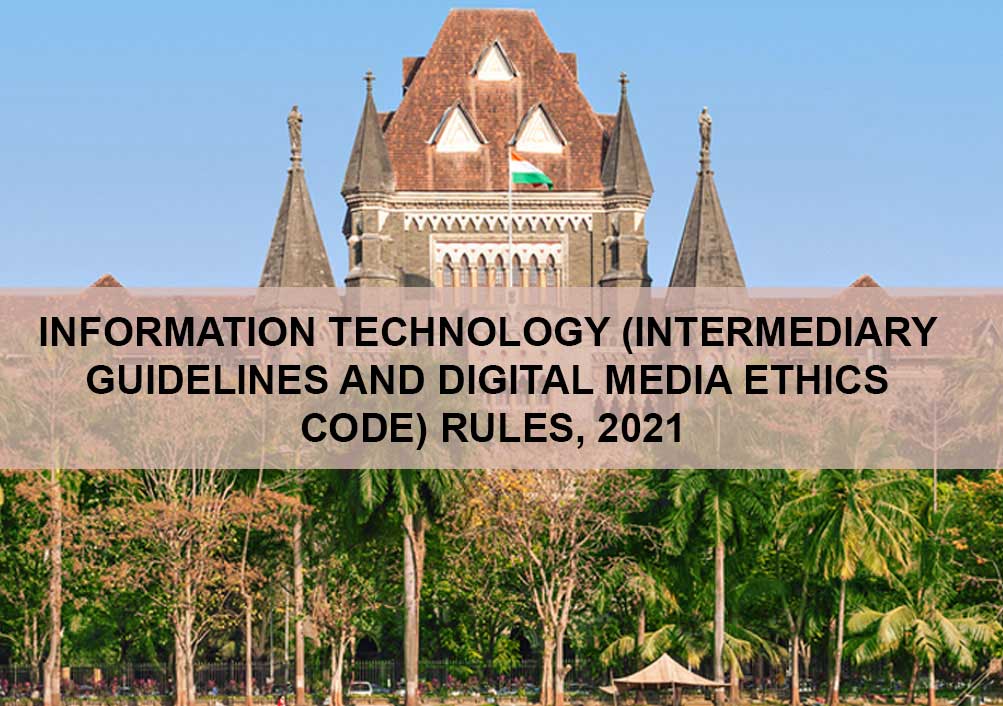Bombay HC stays operation of Rules 9(1) and (3) of Centre’s new IT Rules, says it infringes constitutional guarantee of Freedom of Speech and Expression

Read Judgment- Agij Promotion of Nineteenonea Media Pvt. Ltd. & Ors v. Union of India & Anr
Tulip Kanth
Mumbai, August 16, 2021: The Bombay High Court has directed a stay of operation of sub-rules (1) and (3) of Rule 9 of the Information Technology (Intermediary Guidelines and Digital Media Ethics Code) Rules, 2021, while stating that the Rules are manifestly unreasonable and go beyond the IT Act.
These directions of the High Court came pursuant to the filing of two Petitions challenging the 2021 Rules, on the ground that they are ultra vires the Information Technology Act, 2000 and the provisions of Articles 14, 19(1)(a) and 19(1)(g) of the Constitution.
“The indeterminate and wide terms of the Rules bring about a chilling effect qua the right of freedom of speech and expression of writers/editors/publishers because they can be hauled up for anything if such committee so wishes,” stated the Division Bench of Justices Dipankar Datta and G.S. Kulkarni.
Out of these two Petitions, the first had been filed by a company which owns and operates a digital news web portal “The Leaflet” offering a platform to eminent personalities, renowned journalists, academics, social workers and common citizens to express their views. The second, being a PIL, had been filed by a journalist, Nikhil Mangesh Wagle.
The Provisions in question provide for Code of Ethics and Procedure and Safeguards in Relation to Digital Media. Rule 9 specifically deals with observance and adherence to the Code.
The Petitioners primarily argued that the 2021 rules are ex-facie draconian, arbitrary and patently ultra vires the provisions of the IT Act and the provisions of Articles 14, 19(1)(a) and 19(1)(g) of the Constitution.
It was also submitted that the 2021 Rules are so wide that they expressly transgress not only the provisions of the IT Act but also the fundamental right to free speech and expression.
Whereas, referring to the affidavit of the Deputy Secretary in the Ministry of Information & Broadcasting, the opposite party – Union of India — argued that out of 1800 digital media publishers, 97% publishers of news and current affairs houses have not challenged the 2021 Rules and thus the provisions are accepted and implemented.
The Bench noted that Rule 9, prima facie, suffers from two illegalities – firstly, it imposes an obligation on the publishers of news and current affairs content and publishers of online curated content, to observe the Code of Ethics under a completely different statutory regime alien to the IT Act, namely, by applying norms of Journalistic Conduct of the Press Council of India under the Press Council Act,1978 (PC Act) and Programme Code under Section 5 of the Cable Television Networks (Regulation) Act,1995 (CTVN Act).
Secondly, section 87 does not confer any power on the Central Government to frame rules contemplating such provisions under clauses (z) and (zg) of sub-section (2). Thus, the contention that Rule 9 is intended to carry out the provisions of the IT Act, could not be accepted.
The fact that the two provisions referred to in the “Code of Ethics”, namely, Norms of Journalistic Conduct of the Press Council of India under the PC Act and the Programme Code under Section 5 of the CTVN Act are under different statutory regimes occupying the field for the purposes of those two enactments, could not be overlooked.
The Court also found it difficult to comprehend as to how such fields which stand occupied by independent legislations can be brought within the purview of the impugned rules and substantive action can be taken for their violation under the impugned rules.
The High Court observed that allowing the operation of the 2021 Rules would result in the writer/editor/publisher standing the risk of being punished and sanctioned, should the inter-departmental committee be not in favour of criticism of any public figure.
“Dissent in democracy is vital. It is, however, the checks and balances that make a democracy work. There can be no two opinions that a healthy democracy is one which has developed on criticism and acceptance of contra views. Opinion based on criticism reinforces its acceptance in a democratic society,” added the Bench.
The Court also opined that Rule 9 prima facie appears to be infringing the constitutional guarantee of Freedom of Speech and Expression as conferred by Article 19(1)(a) in subjecting the publishers of news and current affairs content and publishers of online curated content subject to action under the statutory regime of the PC Act and the CTVN Act, which provides for an independent mechanism for any violation of the provisions of such legislation.
Sign up for our weekly newsletter to stay up to date on our product, events featured blog, special offer and all of the exciting things that take place here at Legitquest.




Add a Comment